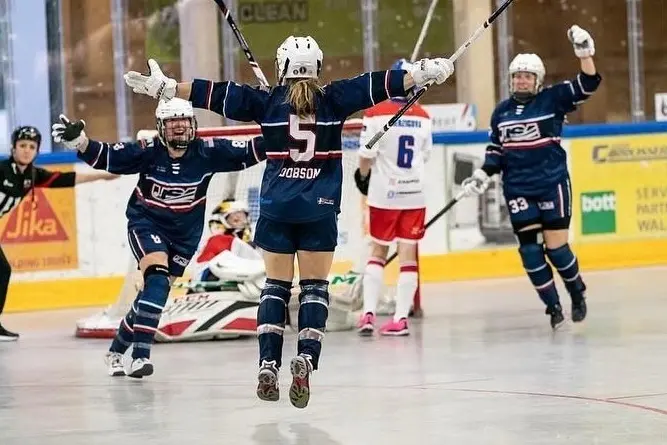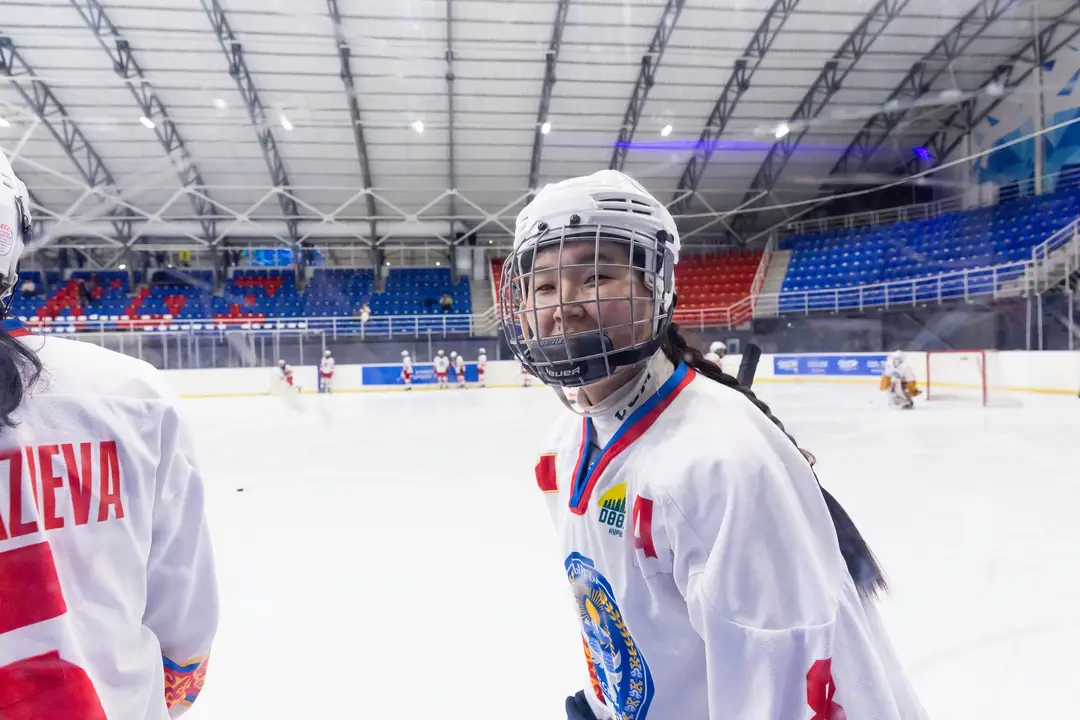
Having stood between the pipes with Team Great Britain for over six years, goaltender Rachel Jackson possesses significant stature as one of the program’s most notable players. Since her first appearance at the ISBHF Worlds took place in Bratislava, Slovakia in June 2011, the chance to help contribute to an exciting chapter in British female sporting history has represented a tremendous point of pride.
Undoubtedly, the efforts of competitors such as Jackson served as a catalyst to promote the growth of ball hockey throughout Great Britain. From humble beginnings, where the assembly of a national team represented a patchwork of players from numerous backgrounds, Jackson is part of a group known affectionately as the “Original 16”.
With their combined efforts, the chance to grace the court internationally in Bratislava, Slovakia resulted in an exceptional evolution taking place. Resulting in the eventual formation of a British national tournament, destined to serve as a source of talent for future editions of Team Great Britain, it has also welcomed ice hockey competitors to its ranks, mirroring a phenomenon occurring in other nations,
“The best bit about playing for Team GB has been how much the sport and the number of women playing it has grown in the six short years since we cobbled together a team for Bratislava.
In 2011, we took only 16 players (two of whom were goalies, I played outfield) to Bratislava. A good proportion of that "Original 16" was begged, borrowed and stolen from women’s ice hockey. At the time that Ali Cree and Christine Lynch were trying to put together a women’s team, there were less than 10 female ball hockey players in the country.
Now there are sufficient female ball hockey players to field about 8 teams if not more at National Tournaments. Following St John’s (in 2013), we set up the first local women’s ball hockey team in the UK, The Angry Beavers, (a subset of the North East Dekstars), played in the 2013-14 Northern Conference.
In 2015, we held the first ever UK women’s ball hockey tournament, with six teams, three of which were ice hockey teams who forgot their skates. This year, there shall be three women’s tournaments.”
Earning a Master of Engineering at the University of Newcastle-upon-Tyne, Jackson balanced her studies with a sensational hockey career that involved play on both the ice and the court. During her university years, she made her debut for Great Britain’s ball hockey team at the 2011 ISBHF World Championships in Bratislava, Slovakia.

Also competing at the club level with the North East Dekstars Ball Hockey Team, she was just as prominent on the ice. In addition to participating with the Whitley Bay Squaws Ice Hockey Team, capturing postseason titles in 2012 and 2013, she was also a member of the Newcastle University Wildcats Ice Hockey Team. As a side note, Jackson also excelled in field hockey and rowing while in high school, fostering the competitive spirit.
Currently a graduate civil engineer, Jackson has worked on numerous placements, including duties such as an engineering surveyor, property engineer, and a civil design engineer. Having also served in an engineering capacity with the renowned London Underground, Jackson has still managed to make time for her hockey endeavors, serving as a beacon for the game’s growth in Great Britain.

As Jackson’s international ball hockey journey has taken her to both sides of the Atlantic, the 2015 edition of the ISBHF Worlds represented a unique aspect. In recounting the accommodations for the British contingent in Zug, such a scenario involves a romantic nostalgia, one that is destined to be part of the program’s legend. Incorporating elements of unconventional behavior and admirable peculiarity,
“Team GB are also known for being a tad on the eccentric side, whereby staying in a Civil Defence Shelter in Switzerland put us in the local newspapers. The other teams laughed until they found out that we had brought a chef with us.
In addition, we had a lovely nightwatchman called Arnie who washed all our (both the men’s and women’s teams) kits overnight too. Team Canada’s coaches even asked to use our washing machine and brought over a large bag of socks and pants!”
During the 2017 edition of the ISBHF Worlds in Pardubice, Czech Republic, Jackson shared goaltending duties once again with Megan Quigley, providing the British with a very solid duo of talented backstops. The two were also the British goaltending duo at the previous Worlds, held in Zug, Switzerland.

In getting the chance to be teammates on the game’s biggest stage, there was a mutual respect, helping to sustain Great Britain’s fighting spirit. Undoubtedly, the two hardest working goaltenders in Pardubice, the tremendous work ethic displayed by Jackson and Quigley was not only a source of inspiration for their teammates, but it represented the essence of perseverance.
With Team Great Britain, there is certainly no goaltending controversy. Both encourage each other, removing any thoughts of competition between them. In facing so many shots during any given game, the two are part of a collaborative effort to keep their team competitive, testament to their character.
“I am very glad that Quiggles (known as Megatron 5000 by women’s coach and Ball Hockey UK President, Carl Wood) joined the ball hockey world in 2014. It is not really realistic to only take one goalie for the World Championships for any nation. Especially for the less experienced teams and us goalies seeing as many shots as we do.
Despite playing roughly equal time in Pardubice, we both saw more shots (158 for me and 156 for Quiggles) than any other goalie in either the men’s or women’s tournament, averaging almost a shot per minute played.
We went to St John’s with only one keeper, and it was gruelling, especially after snapping my quad just prior to the Slovak game, and then playing a further three games with an ice pack tied to my leg and an interesting array of bandages.
It is incredibly useful to have an additional goalie, not just in regards to injuries, but where you know their style and you trust in it too. In Switzerland, I pulled myself out of the Slovak game in the second period, due to their 2-on-1 back-post play becoming recurrent.
Having played against Megs as a Ninja in the Northern Conference and on the Ice for the Wildcats, I know that Quiggles goal-tending style is quite different to mine.
She has better splits and is faster at getting into them (from her many years of gymnastics) and I thought that it would be able to disrupt Slovakia’s back-post play and change the pace of the game. It appeared to work as Slovakia’s goal-run came to an end and Amy Campbell managed to score as well!
It is also really nice that her parents have come to the two previous championships; it is like having a second set of parents for the week, they are very supportive.”

Pardubice represented a heightened sense of purpose for Jackson and her British teammates. Strongly motivated to reach the elusive milestone of their first-ever win in tournament play, it was a necessary plateau that would allow the program to continue its evolution.
Fittingly, Jackson’s presence emerged as a major factor as victory enriched the experience in Pardubice. Facing off against Team Italia, Jackson recorded 33 saves, while a second period goal from Becky Kasner resulted in one of the tournament’s highlights, propelling both of them into British hockey lore.
As a frustrated Italian offense could not solve Jackson’s goaltending brilliance, a jubilant British squad made history twice. In addition to the euphoria of an inaugural victory in round robin play, such a feat was enhanced because it was attained by shutout, emerging triumphant in an emotional 1-0 final.
Taking into account that a valiant Great Britain roster was held scoreless in Zug 2015, there was a sense of redemption in the win, simultaneously providing the program with a restored feeling of confidence. With an Italian roster that featured many “Heritage” players, it only accentuated the impact of defeating them, reaching an unprecedented attainment that allowed Great Britain a chance to stand shoulder-to-shoulder with their peers,
“We have won games previously! Albeit not very frequently…and not in the round-robin stage before. We beat Team Greece in Bratislava (2011), 1-0 to finish 8th (out of the 9 teams). We also beat Greece in the placement stage in St John’s (2013) 2-1, to come 7th out of 8th.
We were disappointed that Hungary and Austria did not continue from 2011 to join the championships in Newfoundland. Although they beat us, we thought that we were quite evenly matched. We were happy that Team Italy were joining so that there was a still a good number of teams, and we also fancied our chances against them, hoping that we could manage two wins this time.
Then, we found out that they were "Heritage" Team Italy and therefore pretty-much all Canadian, they subsequently put 6 unanswered goals against us (this was the same tally as Czech, who went on to get the bronze medal that year). We did better in Zug only losing 3-1 to them.
So, to win a game in the regular round-robin stage was completely unexpected and so stressful at the time! Especially, as the last time we scored first in a round-robin game we ended up losing 3-1 to Greece in St John’s!
My main reaction at the end of the game was that of pure relief. The boys’ support definitely helped in the final stages with Scott Ellard leading the chants.”

Obtaining the shutout against Italy, while contributing towards Great Britain’s round robin victory, actually served as prologue for Jackson. Significant sense of fulfillment was added to the feeling of achievement in the fact that she was also honored as the Player of the Game for Great Britain. Such recognition helped to affirm Jackson’s legacy with the program, ascending her towards a revered iconic status.
“My main reaction at the end of the game was that of pure relief. My team’s reaction at the end of the game was way more special, with Amy sprinting from beyond the Blue Line to be the first for a hug.”
(NOTE: Video footage of the victory can be viewed online – https://www.facebook.com/pardubice2017/videos/1928965267388005/)
Statistically, she appeared in five games, logging 165 minutes played. Facing 158 shots, which was a tournament high, followed by Quigley, who ranked second overall with 156 shots, Jackson nearly averaged one shot per minute. One of only five goaltenders to register a shutout, Jackson had a respectable .886 save percentage, ranking ninth among all goaltenders in Pardubice. Coincidentally, Jackson was also the ninth ranked goaltender at Zug 2015.
By tournament’s end, Jackson’s memorable time was highlighted by another realization. Named to the ISBHF Tournament All-Star Team, the only player from Great Britain to gain such an honor, there was a shared sense of achievement among the entire roster. With Jackson’s All-Star status another encouraging sign that the program continues to rise, the feeling of euphoric attainment provided her with tremendous fulfillment. Reflecting humbly on such a monumental milestone, it was both overwhelming yet exhilarating, adding to the sense of history that defined such a tournament for a jubilant Jackson,
“Complete disbelief. As in all the championships we have played in previously, GB women have been the underdog, with a main aim to win at least one game and not to come last.
I never expected that anyone from our team would make the All-Star Team, especially as previously the All-Stars have generally been from the medalling countries.
Our boys have made the B Pool’s All-Star Team previously, but they are more evenly matched, with there being a larger number of teams, gaining the Bronze in Zug and the Silver in Pardubice. So, when Brian (Marchetti) picked up his trophy for the B-pool All-Star team I was happy for him and also a tad jealous.
So, to pick up the women’s one, despite our team once again coming last following the placement games was completely unexpected. I also had to borrow Becky’s hoodie to pick it up, as I had traded my t-shirt with a Canadian prior to the men’s A-pool final!”

With six sensational years of service for Team Great Britain, it has provided Jackson with a lifetime of memories. Along with a great run in the North East Dekstars, where she is one of their premier players, her indomitable spirit may be her greatest legacy.
One of Great Britain’s distinguished ambassadors for ball hockey, Jackson combines alacrity and commitment with strong leadership, embodying the essence of fair play and sports. Whether it be locally or internationally, Jackson’s love of the game is without dispute. Helping build the mythology of the women’s game, including at the ISBHF level, the sport has provided Jackson with a second family and a whole new group of friends, resulting in a realization of contentment.
“Playing ball hockey for the Dekstars and subsequently for Team GB has introduced (me) to so many people across the country and internationally that I would never have otherwise met. Despite being able to see some of them only once every two years, we always make sure to catch up. Starting Women’s Ice Hockey in 2010 reintroduced me to the world of the hockey family (I played roller until I was 13), but playing ball has very much extended that family and brought it closer together.”
“All quotes obtained first hand unless otherwise indicated”
Photo credits: Game photos by Daniel Soucek, all other images supplied by Rachel Jackson
[adrotate group=”1″]
Related Articles
Categories
Recent Posts
[adrotate group=”2″]




